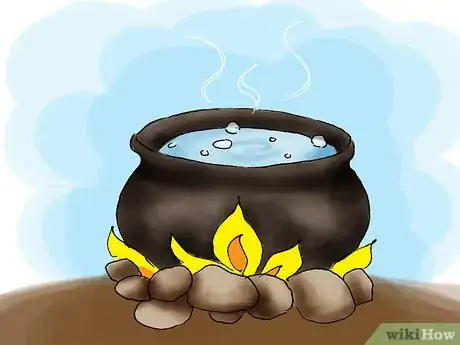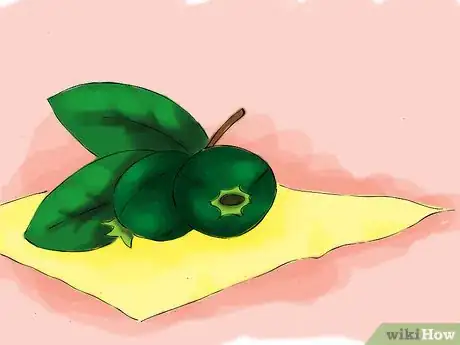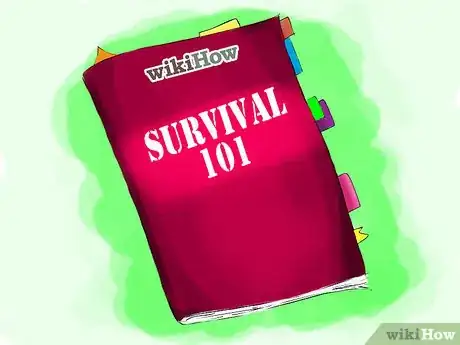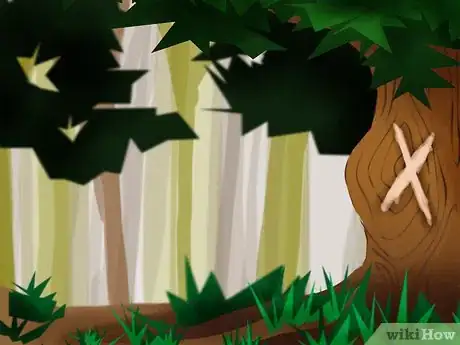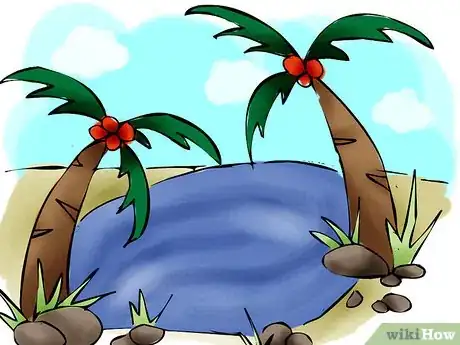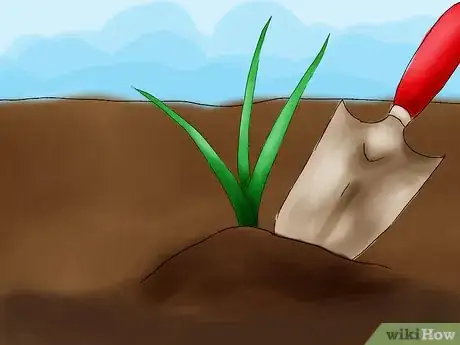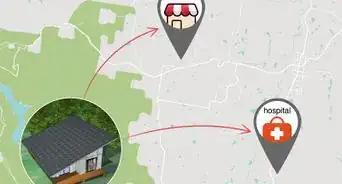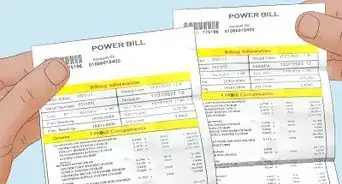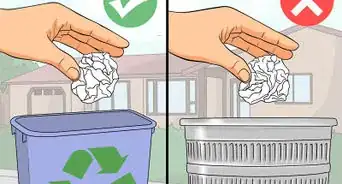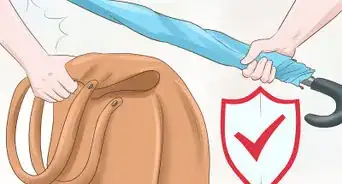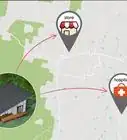wikiHow is a “wiki,” similar to Wikipedia, which means that many of our articles are co-written by multiple authors. To create this article, 20 people, some anonymous, worked to edit and improve it over time.
There are 8 references cited in this article, which can be found at the bottom of the page.
wikiHow marks an article as reader-approved once it receives enough positive feedback. In this case, 87% of readers who voted found the article helpful, earning it our reader-approved status.
This article has been viewed 266,943 times.
Learn more...
Living in the woods, surrounded by nature, is a fantasy of many city dwellers. Running the rat race day after day, dealing with traffic, crime, and pollution -- it's easy to romantically imagine a life more serene. Through proper planning and sacrifice, living in the woods can be an attainable dream. And soon an attainable reality.
Steps
Forming a Plan
-
1Decide where and how you want to live. How deep into the woods do you want to live? Think both geographically and philosophically. If you don't mind a short drive outside of the urban sprawl, you can live surrounded by woods and still have some of the conveniences of the city. You can usually have electricity run to your home and get hooked up to a rural water main. A brief commute and you can be at work, making the kind of money that would be hard for some to walk away from. Or were you thinking of something a little more intense?
- This lifestyle still ties one down to the system; however, it offers most people enough of a reprieve to be happy. Others can't find happiness just on the other side of the suburbs. They desire to be further removed from the rat race, and live deeper in the woods.
- As far as North America goes, great places to get your Thoreau on are British Columbia, the Pacific Northwest of the States, and vast expanses like Montana. Just make sure you're near water! Where you choose all depends on what you have in mind and what kind of weather you're willing to, well, weather.
-
2If you want to live deeper in the woods, plan out your utilities. So many of us take for granted modern conveniences. We turn on our faucet and out comes water. Want light? Flip a switch. Want heat? Just turn up the thermostat. We forget how easy we have it. Although paying for them monthly can be challenging, having a well drilled and installing solar panels and wind turbines require a substantial initial investment that most people simply can't afford. Heating with wood is an option, but cutting wood is back breaking, time consuming work, that would probably have most wishing for the days they paid for their heat. So plan out your utilities! It will help you decide where and how you want to live.
- Do you want to live in a cabin in the mountains or do you want to pitch your own tent and live by the light of an oil lamp? Is the location you have in mind good year around or is it plain freezing in the winter? What about rainfall and other possibly dangerous hazards? Just how much work do you want to be doing?
Advertisement -
3Know the laws. Most areas that you may want to live in are already owned (privately or publicly). If you want to be legal about it, you'll need to buy some land. However, there are seasonal camping passes you can obtain in most states that can also give you a taste of this lifestyle. Then there's squatting -- but that can get you in pretty big trouble. Know the laws of your area and the consequences for your actions before you do anything you may regret.[1]
-
4Consider being in some type of community. If you want to truly live deeper in the woods you really need a community. Not just for your sanity, but to make it feasible. Pooling money is the only way most people can afford the high initial start up costs of living as far from the rat race as possible. Land purchase, construction materials, solar panels, and having a well drilled, are all very expensive. Even if you plan on living in a sleeping bag and foraging for nuts, a community will help you stay sane -- even if it's just one or two other people![2]
- Want to find some communities that are already doing this? Three Rivers Recreation Area near Bend, Oregon; Breitenbush near Salem, Oregon; Dancing Rabbit in Missouri; Twin Oaks in Virginia; Earthhaven in North Carolina; Greater World Community near Taos, New Mexico; and Arcosanti Ecovillage in Arizona are all established off-the-grid communities.
- Don't attempt a move to the woods alone. Even if you did miraculously survive, it would not be the kind of existence anyone could stand for very long. We need human interaction to keep from going crazy. Isolation is the ultimate punishment, reserved for our worst prisoners, and it almost inevitably drives them to lunacy. There are stories of hermit mountain men in Alaska who would spend weeks traveling to another's cabin and sometimes just sit, not saying anything for a whole day, forgetting how to converse, but still craving being in the company of another human being. Unless you want to be a hermit, of course.
- Want to find some communities that are already doing this? Three Rivers Recreation Area near Bend, Oregon; Breitenbush near Salem, Oregon; Dancing Rabbit in Missouri; Twin Oaks in Virginia; Earthhaven in North Carolina; Greater World Community near Taos, New Mexico; and Arcosanti Ecovillage in Arizona are all established off-the-grid communities.
-
5Don't burn your bridges. It's not a good idea, when you're on this woods-living kick, to call up your mom/boss and tell them a thing or two about where they can stick it and then tell them you're going to go live in the woods. You may need them when a bear's attacked you or all the rice is gone. Whatever connections you're thinking about leaving behind, do it tactfully. You may need them later.
- Let everyone that you care about, that cares about you, know of your plan. Explain your reasons as logically as possible. Most of them will probably be naysayers, most of them probably won't understand, and that's fine. They don't need to. But they do deserve the privilege of knowing and not worrying about you.
Being Adequately Prepared
-
1Try it temporarily first. Capitalism has a tendency to stick in the craw of some of us and have us swearing that, "We'd be better off living in the woods!" Sure, society has gotten to you, the materialism of every inch of this world is heartbreaking, but just try it temporarily at first. Seriously. You wouldn't buy a house without looking at it first, right? You wouldn't get married to a stranger. You wouldn't buy a car without test-driving it, yeah? So try it temporarily. There's always the possibility that you'll hate it. Or that a month will be enough![3]
- Remember those seasonal camping passes we mentioned? Those are perfect for this. Only instead of de-winterizing the RV, go out there with your tent, your sleeping bag, a jar of peanut butter, and a fishing net. How long can you last? How long can your happiness last? If you love it, come back, stock up for the year, and go back. No harm, no foul.
-
2Use the summer and fall to your advantage. You know Napoleon attacked Russia in winter and the Russians were all, "Good luck with that, buddy?" Don't be Napoleon. When the weather is nice, stock up. Gather your food (whether it's canned goods or nuts you're burying for winter), gather your firewood, gather your blankets and your snow gear, and ready yourself for the harsher months. When winter does roll around, you can stay in your tent sipping tea from pine needles and reading Emerson.[4]
- Also use the summer and fall to practice your skills. You'll need to get decent at setting traps, sharpening knives, hunting and gathering, preserving meat, recognizing plants, first-aid, fire building, and fishing (fly, net, and regular), just to get you started.
-
3Gather supplies. If you're in this for the long haul, there will be times when Mother Nature isn't so nice to you. There will probably be heavy rainfall (or drought), snow, wind, fires, and ice to combat. Be sure you're prepared for anything and everything! Here's a quick list of things you'll need to get you started:[5]
- Heavy layers, boots, long underwear, gloves, hats, scarves
- Multiple tents and blankets (including a space blanket (extremely reflective Mylar -- good for battling the elements and hypothermia))
- Matches, a fire steel (a metal match) tinder and flint, making fire easier to create in cold and wet times
- Flashlight, lantern, extra batteries, radio, whistle
- First-aid kit, medicines, antiseptic, water-purifying tablets
- Tools, rope, knives, cord, waterproof canisters
-
4Get real. This is no joke. Living in the woods is a dangerous situation and many haven't made it out alive. If you plan on doing it for an extended amount of time, what amenities of civilization to you want to hold onto? It's not selling out to have a cup to drink out of, you know. Consider the following:
- Camping stove
- Dry goods, canned or otherwise (carbs are a good idea)
- Cups, silverware, plates, pots, pans
- Radio, walkie-talkies
- Books and other entertainment
-
5Read up on the art of forestry. If you dropped most people into the woods, they'd die in a matter of days. Days might even be generous. But if you read up on what you can use to your advantage when it comes to the local flora and fauna (Birch wood is good for bedding and shelter!), life will be a lot more interesting and a lot easier. And you won't end up munching on those poisonous berries for dinner.
- If you think the corporate world is cruel, the woods can be just as terrifying, if not more. There are plants that will make you bust out in hives, there are plants that are only poisonous when raw, there are plants with delicious berries but leaves that give you diarrhea, and that's not even mentioning the trees, soil, and animals. So get to book learning!
- "Bushcraft - Outdoor Skills and Wilderness Survival" by Mors Kochanski is a good place to start. There's also "How to Live in the Woods" by Homer Halsted and the entire thing is available online![6]
-
6Consider arming yourself. With the right licensure, carrying a gun isn't a terrible idea. It could get you out of a sticky situation or two -- but do know that it could also get you into one, too. And did you plan on doing any hunting?[7]
- Apart from that, consider investing in bear spray and other devices to ward off dangerous animals. You don't need to tote a gun to defend yourself, but you shouldn't rely on your bare hands either. You probably don't want to strap broken bottles to your knuckles and fight off wolves in the snow, you know?
-
7Learn about the area. If you do yourself one favor, it'll be learning about your area. You want to live near water, you want to live where there isn't a lot of danger (from nosy park rangers or grizzlies, whichever), and you want to know what exactly you have at your disposal. Sure, you could figure it out as you go, but since you have the liberty of picking where you end up, might as well pick the best place.
- Be sure to equip yourself with a map and compass. You will get lost. You will wonder where that one cave was. You may even decide you've had enough and decide to do the 10 mile (16 km) trek back to the highway. Who knows? Just have them for when you need them. You know how to use a compass, right?
Living in the Woods -- Not Just Surviving
-
1Have comfortable shelter. This part is ultimately up to you: Do you want to erect a magnificent log cabin or are you more at home in a tent? What can you build that would take advantage of the sun, the trees, not be an eyesore, and withstand the elements? And where is the best place to make your home base?
- There are dozens of ways to erect a tent. Before you go about settling for a lean-to, spend a little bit more time on wikiHow. There's a plethora of camping articles you've yet to use to your advantage.
-
2Master the survival techniques. You're not just camping for a week, spending most of it floating down a river drinking Mike's Hard. You need some serious skills because this is your life 24/7. Here's a very non-exhaustive list of articles you should get to reading! You need to eat, stay warm, and be hygienic above all else, but the entire list is useful.
- How to Build a Fire
- How to Purify Water
- How to Create a Tripwire Trap
- How to Make a Snare Trap
- How to Make a Day Survival Kit
- How to Fish
- How to Hunt
- How to Take a Bath in a Sink, Bucket, or River
- How to Make and Use a Solar Oven
-
3Stay hygienic. When it comes to pooping in the woods (we're just gonna put it out there because you know we're all thinking it), you basically have two options: going about your business wherever and however you like or developing some long-term system more than 200 feet from a water source. Did you know there's such a thing as a composting toilet where you can use waste to fertilize the ground? If you're there for a while, might as well make the world a better place for it![8]
- While you can go for the traditional ditch latrine, there's also the option of a regular camping toilet. Heck, with all your free time, you could develop a brand new system, too.
- And then there's bathing. Hopefully there's a river nearby, right? Aside from having drinking water, it's also good so your own stench doesn't drive you batty. But if for some terrible reason that's not an option, you can make a sweat bath. It's kinda like an outdoors sauna. It'll probably be a trend for city-dwellers in a few years!
-
4Consider living near something urban. While you may consider having a reprieve from the wilderness life defeating the purpose, it can come in very handy to live ten miles away from a gas station. If you're dying, just really need a real toilet, or would kill the next person you see for a package of beef jerky, it can be a true Godsend. Or if you live semi-near a town, you can go in once every few months for a few staples. There's no harm in it, Your eco-footprint is already marginal compared to the rest of us!
- If this is something that intrigues you, you may need a form of transportation. A bicycle makes the most sense, though a motorcycle or moped may also be feasible. Just know that it's one more thing you must know how to maintain. If you do go down this route, familiarize yourself with the mechanics of your vehicle. You should be its master -- not the other way around.
-
5Consider upgrading. Since you plan on being here for a while, why not upgrade? Go off the grid and provide yourself your own sustainable energy and way of living. It'll take some money, but do think about installing solar panels in your home (or utilizing wind energy), drilling a well and starting a septic system, using a generator, starting composting, and heck, starting farming!
- This is what those communities we mentioned before are doing, but you can definitely do it on your own. You're already going near-green; why not reduce your eco-footprint entirely by providing yourself everything -- literally everything -- you need? Not like you have a 9-to-5 to blame, right? Someone's gotta make up for the rest of us. And imagine how gratifying it would feel to harness your own energy and make all your own food. Holy cow.
-
6Have a craft. You'll probably want something to do with your time, right? Many off-the-gridders make soaps and lotions, make cloth, blankets, etc. from animal hides, wood carve, make teas and syrups, and master other hobbies that utilize nature. You could even make a little side money, if that interests you. Whether it's for a profit or just for you, having an art is a very good, life-affirming thing.
-
7Always do what's best for you. Living in the woods is an enormous feat. Even doing it for days is nothing to shake a stick at. It also can cause a person to get inside their own head and drive themselves crazy. You may come to realize that you don't know who you are, what this thing called life is all about, or what really to do with yourself. It might be infinitely more disturbing than you could ever imagine. Or it could be so freeing you don't know why you didn't do it sooner.
- Either way, always keep your mental health in mind. People will question your sanity, you may even question your sanity, but if you're happy, continue on. Stay safe, warm, healthy, and strive to live the life you dream of. Whatever it may be.
Community Q&A
-
QuestionWhy do most people not make it back alive, living in the woods?
 Nicholas NewmanCommunity AnswerThey are not prepared in the basic needs of survival. You need water most importantly, shelter to keep you from the elements, and a means of obtaining food, which should include something to generate a fire.
Nicholas NewmanCommunity AnswerThey are not prepared in the basic needs of survival. You need water most importantly, shelter to keep you from the elements, and a means of obtaining food, which should include something to generate a fire. -
QuestionHow do I train animals to serve me?
 Community AnswerIt would be quite difficult to domesticate feral animals to do your bidding. However, if you put out food routinely for the animals sharing the woods with you and pose them no threat, they will at least view you as an ally over time, and visit routinely.
Community AnswerIt would be quite difficult to domesticate feral animals to do your bidding. However, if you put out food routinely for the animals sharing the woods with you and pose them no threat, they will at least view you as an ally over time, and visit routinely. -
QuestionIs it legal to live in an area that no one owns?
 Community AnswerTechnically, however, there are not many places left that no one owns. Just because you don't know who owns it doesn't mean it's not owned.
Community AnswerTechnically, however, there are not many places left that no one owns. Just because you don't know who owns it doesn't mean it's not owned.
Warnings
- Don't just take a knife and box of matches and get dropped off in some isolated wilderness because you've watched all the Bear Grylls episodes and you think you are an expert. You will most likely die.⧼thumbs_response⧽
References
- ↑ https://offgridworld.com/off-grid-living-is-illegal-sort-of/
- ↑ https://www.psychologytoday.com/us/blog/emotional-nourishment/201612/why-we-need-each-other
- ↑ http://survival-mastery.com/skills/bushcraft/living-in-the-wilderness.html
- ↑ https://www.popularmechanics.com/adventure/outdoors/a27006063/living-off-the-grid/
- ↑ https://bugoutbagacademy.com/13-survival-kit-list-items/
- ↑ https://archive.org/details/howtoliveinwoods00halsrich
- ↑ http://dnr.alaska.gov/parks/safety/bears.htm
- ↑ https://www.offgridweb.com/preparation/survival-hygiene-wilderness-wash-up/

